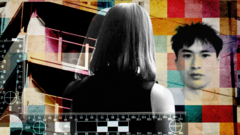**As the Pelicot trial ends, unanswered questions linger about the road ahead for victims, the judicial system, and societal change.**
**The Unresolved Legacy of the Pelicot Trial: Questions that Remain**

**The Unresolved Legacy of the Pelicot Trial: Questions that Remain**
**Insights into future ramifications and the journey ahead for Gisèle Pelicot and her family.**
The Pelicot trial, which captivated France and the world, concluded with Gisèle Pelicot emerging as a groundbreaking figure in the fight against sexual violence. Despite Dominique Pelicot receiving a 20-year sentence for drugging and raping her while facilitating abuse by others, questions about the aftermath of this monumental case linger.
1. **What Lies Ahead for Gisèle Pelicot?**
After entering the public eye during the trial, Gisèle Pelicot is now a well-known figure, having transformed from a private individual to a symbol of resilience and resistance against sexual violence. Despite her brave testimony, the pressure of fame and public scrutiny poses risks to her personal life and privacy. While she may wish to return to her tranquility through music and time with her grandchildren, her identity as a survivor will remain public. “She has endured a transformation that may alter her course forward,” stated her attorney, Stephane Babonneau.
2. **What's the Status of Caroline Darian?**
The daughter of Dominique Pelicot, Caroline Darian, openly struggles with the trauma tied to her father’s actions. Following her father's conviction, Caroline described finding a photo of herself in a vulnerable position, further deepening her wounds. Her allegations of emotional neglect by her mother, Gisèle, reveal a fracture within the family amidst the trial’s chaos. Caroline laments being treated as a secondary victim: "Fighting for recognition alongside my mother has taken its toll," she wrote, reflecting a family grappling with their shared trauma.
3. **Will Defendants Exercise Their Right to Appeal?**
Following the conclusion of the trial, legal analysts ponder whether the convicted parties besides Dominique Pelicot will appeal their sentences. The disparity between the sentences and the prosecutors' demands may drive some defendants – like those who received notably lighter penalties – to seek further legal recourse. As appeals can be filed in the following days, defense attorneys are weighing their next moves. Legal challenges may further complicate the aftermath for survivors pursuing justice.
4. **What Other Crimes is Dominique Pelicot Linked To?**
Dominique Pelicot's dark history raises suspicions about additional unresolved cases. He confessed to an assault in 1999 but continues to deny involvement in the unsolved rape and murder of another woman. Investigators are reviewing multiple cold cases involving similar patterns of assault, with calls for broader investigations rising among the populace. Are there additional victims entwined in his web of terror?
5. **Will the Pelicot Trial Spark Legal Reform?**
There’s a growing sentiment among the public that the trial signifies a watershed moment in France, heralding potential changes in attitudes and legislation regarding sexual violence. Calls for stricter laws and better education on consent have intensified. However, political challenges remain daunting. “Change requires persistence and courage,” noted Béatrice Zavarro, a prominent figure advocating for educational reform. As discussions about sexual violence proliferate, the path to tangible change remains obscured.
With these lingering questions, the Pelicot trial exposes deeper societal challenges that demand urgent dialogue and action. As these topics gain visibility, it becomes clear that while the case may have ended, its implications will continue to resonate within French society and beyond.
1. **What Lies Ahead for Gisèle Pelicot?**
After entering the public eye during the trial, Gisèle Pelicot is now a well-known figure, having transformed from a private individual to a symbol of resilience and resistance against sexual violence. Despite her brave testimony, the pressure of fame and public scrutiny poses risks to her personal life and privacy. While she may wish to return to her tranquility through music and time with her grandchildren, her identity as a survivor will remain public. “She has endured a transformation that may alter her course forward,” stated her attorney, Stephane Babonneau.
2. **What's the Status of Caroline Darian?**
The daughter of Dominique Pelicot, Caroline Darian, openly struggles with the trauma tied to her father’s actions. Following her father's conviction, Caroline described finding a photo of herself in a vulnerable position, further deepening her wounds. Her allegations of emotional neglect by her mother, Gisèle, reveal a fracture within the family amidst the trial’s chaos. Caroline laments being treated as a secondary victim: "Fighting for recognition alongside my mother has taken its toll," she wrote, reflecting a family grappling with their shared trauma.
3. **Will Defendants Exercise Their Right to Appeal?**
Following the conclusion of the trial, legal analysts ponder whether the convicted parties besides Dominique Pelicot will appeal their sentences. The disparity between the sentences and the prosecutors' demands may drive some defendants – like those who received notably lighter penalties – to seek further legal recourse. As appeals can be filed in the following days, defense attorneys are weighing their next moves. Legal challenges may further complicate the aftermath for survivors pursuing justice.
4. **What Other Crimes is Dominique Pelicot Linked To?**
Dominique Pelicot's dark history raises suspicions about additional unresolved cases. He confessed to an assault in 1999 but continues to deny involvement in the unsolved rape and murder of another woman. Investigators are reviewing multiple cold cases involving similar patterns of assault, with calls for broader investigations rising among the populace. Are there additional victims entwined in his web of terror?
5. **Will the Pelicot Trial Spark Legal Reform?**
There’s a growing sentiment among the public that the trial signifies a watershed moment in France, heralding potential changes in attitudes and legislation regarding sexual violence. Calls for stricter laws and better education on consent have intensified. However, political challenges remain daunting. “Change requires persistence and courage,” noted Béatrice Zavarro, a prominent figure advocating for educational reform. As discussions about sexual violence proliferate, the path to tangible change remains obscured.
With these lingering questions, the Pelicot trial exposes deeper societal challenges that demand urgent dialogue and action. As these topics gain visibility, it becomes clear that while the case may have ended, its implications will continue to resonate within French society and beyond.




















